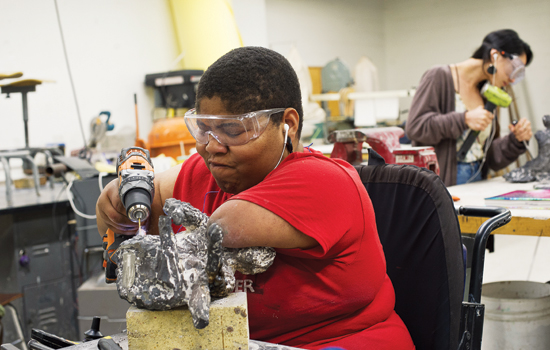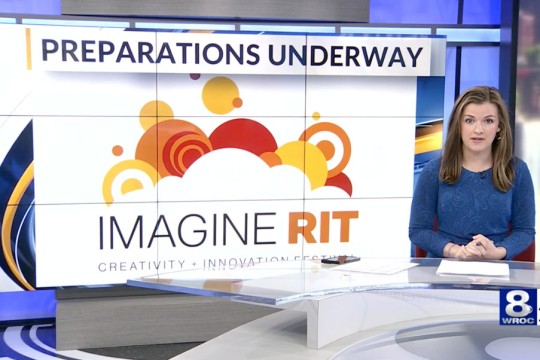Students thriving 25 years after ADA
A. Sue Weisler
Shwanda Corbett, a third-year fine arts student, concentrates on using a dremel tool to add detail to her piece, Sir Henry, in Figure Sculpture class. Corbett, who has one arm and no legs, plans to earn her master’s degree and hopes to one day inspire student artists.
Shwanda Corbett experiences life by thinking differently. Her hobbies are mixed martial arts and welding. Her dream is to earn her master’s degree and build a career as a sculpture professor who inspires young artists.
The third-year fine arts student doesn’t believe in limitations, despite having only one arm and no legs. Corbett is one of more than 900 RIT students with varying disabilities who learn and thrive on campus.
As the nation and RIT’s campus community celebrate the 25th anniversary of the signing of the Americans with Disabilities Act this year, RIT remains committed to providing equal access to programs, services and physical facilities to students with disabilities.
RIT was a trailblazer in providing services to students with disabilities long before the passage of the bill. With the addition of the National Technical Institute for the Deaf in 1965, RIT became widely recognized for its welcoming atmosphere and a community proud of its diversity.
The first federal support services grant for students with disabilities was awarded to RIT in 1975, according to Judith Bernhart, academic coordinator of RIT’s TRiO Support Services Office—a federally funded program serving low-income, first-generation and disabled college students.
It was at that time that the university dramatically increased its awareness of accommodations for students with disabilities through fixing curb and elevator access throughout the campus and providing necessary transportation services. Note takers were first hired, extended testing time was introduced to students and textbooks were transcribed onto audiotapes or into Braille for those with limited vision.
In the 25 years since the passage of the ADA, significant progress has been made to develop and implement even more programs and services that are directly and uniquely tied to student access.
Here’s a look at how these programs have helped three students.
A sense of belonging
Growing up in a poor, violent neighborhood in Pascagoula, Miss., Corbett wasn’t allowed to play outside like the other kids. Instead, she spent hours at a time in a dimly lit room listening to classical music, drawing, painting and scrutinizing Renaissance art books given to her by her mother.
“That room is where it all began—my exposure and devotion to art,” she said. “Even though I don’t have legs and only one arm, I’ve always been a very independent person. It was my high school guidance counselor who persuaded me to go to college and pursue my passion for art—and make something of myself.”
Surprised by a lack of accommodations for students with disabilities at Mississippi University for Women, Corbett transferred into RIT’s ceramics program, based on the recommendation of her sister Jarlisa, who graduated from RIT in May. Since arriving on campus two years ago, Corbett has kept her eye on the prize.
Today, she is a thriving art student who loves her classes in performance art, printmaking, sculpture, and even her physical education classes like Extreme Fitness where she uses free weights and works on developing her core muscle strength. And she said the fact that she has only one limb drives her even harder. “Ironically, I find that I’m actually drawn to physical challenges,” she said. “I like to push myself and overcome what most people think can’t be achieved.”
Corbett makes her way around campus in a motorized wheelchair and credits faculty and staff with clearing pathways for students with disabilities—literally and figuratively—while providing a positive environment and crucial support services—all things she didn’t have in Mississippi.
“I’m most proud of the support that RIT faculty provide to their students—really whether they’re disabled or not,” she said. “I’m able to do many things on my own when it comes to ceramics, but I found that I was struggling with sculpture and figure sculpture, in particular. I do need help, which is difficult for me to admit. My professors saw my struggle and showed me alternate ways to create my artwork. I mean, art is my whole life. This level of caring is so important to my success here and to my future as an art instructor.”
Corbett takes advantage of housing accommodations, including a larger-sized dorm room and bathroom that makes maneuvering her wheelchair much easier. She is also eligible to use RIT-provided transportation services for door-to-door pick-up and drop-off if Rochester’s snow and ice inhibit the use of her wheelchair.
“Let’s face it; there are always things that I’m going to need help with, like pouring metal, for example. But I’m glad that I’ve been given the tools to do most everything myself.”
Ready to face his future
Mason Chronister shares a birth date with the historic signing of the ADA—July 26—although one year apart. Even though he wasn’t born when the law was passed, he maintains an acute awareness of what the legislation means.
Chronister, who earned his Associate in Applied Science degree in administrative support technology in May from RIT’s National Technical Institute for the Deaf, is deaf and has Usher Syndrome, a rare genetic condition resulting in a combination of hearing loss and slow-developing visual impairment that causes night blindness, loss of peripheral vision, and ultimately, complete vision loss.
Chronister, from Red Lion, Pa., was born deaf to hearing parents and attended mainstream schools. He didn’t start noticing the effects of Usher Syndrome until he was about 14 years old.
“As time has gone on, it’s gotten worse,” he said. “Today, I’m not able to see at night and my peripheral vision is so limited that I can’t see objects in my walking path. Sometimes I look clumsy because my balance has been affected. But despite all of my challenges, I’ve always known that I can accomplish anything.”
Chronister knew that attending a school for the deaf would be his best option, and the reason he selected RIT was clear.
“RIT seemed like a friendly place for people with a variety of disabilities and the Usher Syndrome community at RIT/NTID was growing,” he explained.
As a student, Chronister used the services that best suited him, including note taking, interpreters specializing in low vision and the Vision Support Committee, a campus organization committed to assessing and addressing potential accessibility and safety concerns for low-vision students.
“Sometimes a professor would write too small or use a marker in a color that I couldn’t see well,” he said. “But once I explained to them what Usher Syndrome is all about and what I needed as a result, everyone was responsive, accommodating and helpful.”
He also found ways to make his campus living environment functional and comfortable. His request for a single room on a lower level was accepted by Disability Services and facilitated by Housing Operations after he sometimes tripped over his roommate’s belongings.
“Living in a single room was much more relaxing for me and of course, I knew where everything was. In addition, my residence hall advisers would leave hallway lights on so I could see if I needed to get up in the middle of the night for some reason. Everyone was so patient and understanding.”
With assistance, Chronister was also able to pursue his interest in theater.
“I saw another student with Usher Syndrome participate in the theater, and that really inspired me,” he said. “It was a true team effort—from our director to the other deaf and hearing actors and interpreters—to be sure that everything came together and worked out for me.”
As for his career aspirations, he recently started working as an administrative professional with the Defense Logistics Agency, a branch of the U.S. Department of Defense located about an hour away from his home in Pennsylvania.
“No one knows what the future holds,” Chronister added. “Every day they are making strides in the medical field and I continue to keep my strong faith. With the support of my family and friends, I refuse to let my loss of vision and hearing prevent me from doing everything I want to do. I refuse to set up barriers for my own success.”
Leaps and bounds
Early on, Brittany Dzugas-Smith and her family knew that there were setbacks related to her language development—setbacks that would prevent her from learning to read until she was 12 years old.
Today, Dzugas-Smith is a third-year ASL-English interpreting student at NTID, on the cusp of graduating from college and beginning a career as a sign-language interpreter.
Dzugas-Smith has spent her life working through her language-based learning disabilities, which include dyslexia; dyscalculia (difficulty understanding and manipulating numbers); executive function disorder, which is characterized by difficulty organizing and maintaining schedules; and central auditory processing disorder, a hearing problem that interferes with the way the brain recognizes and interprets sounds. She attended Landmark High School in Massachusetts, dedicated to serving students with learning differences.
“At Landmark, the only foreign language offered is sign language,” she said. “Many of the students need special instruction and remediation to learn to read and write English, so it would be hard to begin learning another language on top of that. I absolutely fell in love with sign language and it just seemed to come naturally to me. Now I can’t imagine doing anything else with my life.”
During her first and second years at RIT, Dzugas-Smith worked to understand her educational needs, including making use of extra time on tests and assignments and taking tests in separate locations.
She has utilized the EMPOWER program, a fee-based service offered through the RIT Academic Support Center that helps students address issues related to academic planning and strategies, organization, motivation, procrastination and course selection.
Her TRiO Support Services mentor helps her edit research papers and create résumés. Other services available free-of-charge for students include study groups, one-on-one assistance navigating college life, career and co-op advising, and financial literacy education.
Dzugas-Smith also knows that she and other students with language-based learning disabilities are supported by the Academic Support Center when it comes to receiving additional tutoring and mentoring.
“There is a wealth of opportunity and resources that help students like me succeed at RIT,” she said. “I also take matters into my own hands, though, and meet with my professors regularly one-on-one throughout the semester to check in about my progress. My professors are also very accommodating and are willing to do what they can to help me.”
Dzugas-Smith also has a message for those people unfamiliar with language-based learning disabilities. “Students with disabilities like mine look normal; we just require teaching styles that may deviate from tradition. But I’m the perfect example of what can be achieved with the right support, encouragement and positive attitude.”
A closer look at Disability Services
RIT’s Disability Services Office, which opened its doors to students in 1998, reviews requests for accommodations due to a disability and determines what should be offered. Accommodations include testing modifications, alternate testing locations, changes to standard housing placements and use of service and assistance animals.
The office also coordinates with several departments on campus including Facilities Management Services, Housing Operations, Student Health Center, Academic Support Center and Spectrum Support Program, among others, to provide or direct students to support services.
Susan Ackerman has been director of the office since 2005.
“In my opinion, the unique presence of our campus’ deaf community could be one reason for the high level of respect and customer service that we provide to our students and their families,” she said. “Our community is just so positive.”
Ackerman also knows that RIT cannot rest on its laurels. Her office continues to search for ways to offer much-needed services to students with disabilities—both current and prospective. She is working more closely with students who choose to study abroad, as well as those beginning and ending their time at RIT.
“I’d like to expand on the work we do with our graduating students with disabilities to be more supportive in the next steps in their lives—entering the workplace. And it just makes sense to reach out to our prospective students to help ease their transition into college and give them the confidence-building tools to advocate for themselves.”
By the numbers
- 903 RIT students enrolled in spring classes were registered with the Disability Services Office.
- 50 percent of these students have a learning disability and/or attention deficit disorders.
- Of the 903 students, 208 are in NTID; the majority of whom have disabilities in addition to their hearing loss.
- Approximately 100 students have self-identified as being on the autism spectrum.
 Mason Chronister, who earned his Associate in Applied Science degree from NTID in May, lives with Usher Syndrome, a rare genetic condition that combines hearing loss and visual impairment. When he was a student, he used services like note taking and interpreters specializing in low vision to help him succeed.
A. Sue Weisler
Mason Chronister, who earned his Associate in Applied Science degree from NTID in May, lives with Usher Syndrome, a rare genetic condition that combines hearing loss and visual impairment. When he was a student, he used services like note taking and interpreters specializing in low vision to help him succeed.
A. Sue Weisler
 Brittany Dzugas-Smith, a third-year ASL-English interpreting student, says that she and other students with language-based learning disabilities are supported through a variety of programs and services offered at RIT.
A. Sue Weisler
Brittany Dzugas-Smith, a third-year ASL-English interpreting student, says that she and other students with language-based learning disabilities are supported through a variety of programs and services offered at RIT.
A. Sue Weisler















